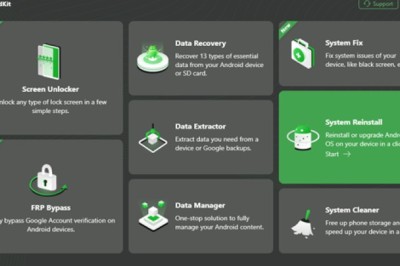views
Unleashing the power of Artificial Intelligence (AI) has transformed our world, making our lives easier and more convenient. From personalized shopping recommendations to intelligent assistants like Siri and Alexa, and with the recent introduction of Chat GPT, an AI writing assistant, it seems that the possibilities of AI are endless.
However, as AI continues to advance, the critical issue of data privacy looms large, posing a threat to the trustworthiness of AI systems.
Imagine this - you receive a targeted advertisement on your social media feed for a product you were just discussing with a friend. Or you notice that the voice assistant in your smart speaker seems to know a little too much about your personal life.
These scenarios raise valid concerns about how your data is being collected, stored, and used by AI systems. Ensuring that AI is developed responsibly and ethically, with a strong emphasis on user privacy, is paramount in building trust in AI.
In this article, we will delve into the complex and vital role of data privacy in developing trustworthy AI. We will explore the implications of data privacy regulations, the ethical considerations that should guide AI development, the impact of data privacy on AI bias and fairness, and the potential of emerging technologies in shaping the future of data privacy and trustworthy AI.
So, buckle up as we unravel the significance of data privacy in building AI systems that we can trust.
The Relationship Between Data Privacy and Trustworthy AI
AI systems often rely on sensitive data, including personal information, biometric data, and financial information. Any breach of this data can harm trust in AI systems and the companies that develop them. Thus, it is critical to implement robust data privacy measures to protect user data and establish trust in AI systems.
Empowering developers to strengthen security teams is one way to improve data privacy measures. Developers must be aware of data privacy concerns and the potential consequences of data breaches. Companies can provide training and resources to developers to help them understand and implement data privacy measures effectively.
AI Agent for Threat Detection is another way to improve data privacy measures. AI agents can detect and respond to potential security threats in real time, providing an additional layer of security to protect sensitive data.
Implications of Data Privacy Regulations on Developing Trustworthy AI
Data privacy regulations, such as the General Data Protection Regulation (GDPR) and the California Consumer Privacy Act (CCPA), are essential for protecting user data and ensuring trustworthy AI systems. GDPR provides a framework for companies to protect the privacy rights of EU citizens, while CCPA provides similar protections for California residents.
Compliance with these regulations is crucial for maintaining trust in AI systems. Companies that fail to comply with these regulations risk fines and reputational damage, undermining trust in their AI systems. Thus, companies must prioritize data privacy in their AI development processes and ensure compliance with relevant regulations.
The Role of Data Privacy in Developing Trustworthy AI
Establishing Trust Through Data Privacy
One of the key factors in developing trustworthy AI is establishing trust with users. To build trust, companies must prioritize user privacy and ensure that their data privacy policies align with user expectations. By doing so, they can build trust in their AI systems and promote the widespread adoption of AI technology.
Prioritizing Transparency
Users need to understand how AI systems work and how their data is being used. By prioritizing transparency, companies can ensure that their AI systems are accountable to users and that potential biases are identified and addressed.
Integrating Ethical Considerations
Companies must ensure that their AI systems are developed responsibly and ethically, taking into account potential ethical concerns such as fairness, accountability, and transparency. Ethical frameworks such as the IEEE Global Initiative for Ethical Considerations in AI and Autonomous Systems can help guide companies in developing ethical AI systems.
Involving Stakeholders
Involving stakeholders, including users, privacy advocates, and experts, in the development of data privacy policies is another critical aspect of developing trustworthy AI. By doing so, companies can identify potential ethical concerns and ensure that their data privacy policies align with user expectations.
Guiding Emerging Technologies
Emerging technologies such as homomorphic encryption and blockchain can enhance data privacy and protect user privacy. Companies must ensure that these technologies are being used ethically and responsibly to develop trustworthy AI. It is vital to understand the implications of these technologies and how they can be integrated into AI systems to enhance data privacy.
Empowering Developers
Companies must empower their developers to strengthen their security teams and prevent potential data breaches. By providing developers with the tools and resources they need to prioritize data privacy, companies can ensure that AI systems are developed responsibly and ethically.
The Impact of Data Privacy on AI Bias and Fairness
Data privacy can affect the fairness and bias of AI systems. Biased data can result from insufficient privacy measures, leading to biased AI models. For instance, facial recognition technology has been criticized for perpetuating biases against marginalized communities due to biased data sets.
Thus, it is critical to implement robust data privacy measures to prevent biased data sets and ensure fair and unbiased AI models. Companies must prioritize data privacy to ensure that their AI systems are fair and unbiased.
Emerging Technologies and the Future of Data Privacy and Trustworthy AI
Emerging technologies, such as blockchain and homomorphic encryption, have the potential to improve data privacy and trustworthy AI. Blockchain can provide increased transparency and security in data storage and transmission, while homomorphic encryption allows data to be processed without being decrypted, improving data privacy.
Moreover, these technologies can help establish trust in AI systems by providing users with greater control over their data. For instance, users can use blockchain to manage their data and determine who has access to it. Similarly, homomorphic encryption can provide greater control over data, enabling users to share data securely without compromising their privacy.
As we move towards a future powered by AI, it is imperative to prioritize data privacy to build and maintain trust in AI systems. Data privacy is not just a legal and regulatory obligation but also an ethical responsibility. Companies must adopt a proactive approach toward data privacy, integrating it into every stage of AI development, from data collection to model deployment.
Final Thoughts
The role of data privacy in developing trustworthy AI cannot be overstated. It requires a comprehensive approach that encompasses robust data privacy measures, compliance with regulations, ethical considerations, stakeholder involvement, and the utilization of emerging technologies.
Companies must prioritize data privacy to ensure that AI systems are fair, unbiased, and transparent. Only then can we create a future where AI is trusted, accountable, and beneficial to all.





















Comments
0 comment